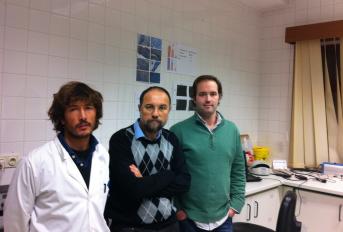Associação Portuguesa de Investigação em Cancro
Polymorphism in the FASL gene as a biomarker of response to immunotherapy with BCG
Polymorphism in the FASL gene as a biomarker of response to immunotherapy with BCG

Luís Lima 1,2,3,4; José A Ferreira 1,5; Ana Tavares 1,6; Daniela Oliveira 1; António Morais 7; Paula A Videira 8; Rui Medeiros 9,10,11,4; Lúcio Santos 1,11,12.
1 Experimental Pathology and Therapeutics Group, Portuguese Institute of Oncology, Porto, Portugal
2 ICBAS, Abel Salazar Biomedical Sciences Institute, University of Porto, Porto, Portugal
3 Nucleo de Investigação em Farmácia - Centro de Investigação em Saúde e Ambiente (CISA), School of Allied Health Sciences – Polytechnic Institute of Oporto, Porto, Portugal
4 LPCC, Research Department-Portuguese League Against Cancer (NRNorte), Portugal
5 Mass Spectrometry Center of the University of Aveiro, Campus de Santiago, Aveiro, Portugal
6 Department of Pathology, Portuguese Institute of Oncology, Porto, Portugal
7 Department of Urology, Portuguese Institute of Oncology, Porto, Portugal
8 CEDOC, Department of Immunology, Faculdade de Ciências Médicas, FCM, Universidade Nova de Lisboa, Lisboa, Portugal
9 Molecular Oncology Group, Portuguese Institute of Oncology, Porto, Portugal
10 Department of Pathology and Molecular Immunology, ICBAS, Abel Salazar Biomedical Sciences Institute, University of Porto, Porto, Portugal
11 Health Faculty of University Fernando Pessoa, Porto, Portugal
12 Department of Surgical Oncology, Portuguese Institute of Oncology, Porto, Portugal
OBJECTIVE: Deregulation of FAS/FASL system may lead to immune escape and influence bacillus Calmette-Guérin (BCG) immunotherapy outcome, which is currently the gold standard adjuvant treatment for high-risk non-muscle invasive bladder tumors. Among other events, functional promoter polymorphisms of FAS and FASL genes may alter their transcriptional activity. Therefore, we aim to evaluate the role of FAS and FASL polymorphisms in the context of BCG therapy, envisaging the validation of these biomarkers to predict response. PATIENTS AND METHODS: DNA extracted from peripheral blood from 125 patients with bladder cancer treated with BCG therapy was analyzed by Polymerase Chain Reaction-Restriction Fragment Length Polymorphism for FAS-670 A/G and FASL-844 T/C polymorphisms. FASL mRNA expression was analyzed by real-time Polymerase Chain Reaction. RESULTS: Carriers of FASL-844 CC genotype present a decreased recurrence-free survival after BCG treatment when compared with FASL-844 T allele carriers (mean 71.5 vs. 97.8 months, P = 0.030) and have an increased risk of BCG treatment failure (Hazard Ratio = 1.922; 95% Confidence Interval: [1.064-3.471]; P = 0.030). Multivariate analysis shows that FASL-844 T/C and therapeutics scheme are independent predictive markers of recurrence after treatment. The evaluation of FASL gene mRNA levels demonstrated that patients carrying FASL-844 CC genotype had higher FASL expression in bladder tumors (P = 0.0027). Higher FASL levels were also associated with an increased risk of recurrence after BCG treatment (Hazard Ratio = 2.833; 95% Confidence Interval: [1.012-7.929]; P = 0.047). FAS-670 A/G polymorphism analysis did not reveal any association with BCG therapy outcome. CONCLUSIONS: Our results suggest that analysis of FASL-844 T/C, but not FAS-670 A/G polymorphisms, may be used as a predictive marker of response to BCG immunotherapy.
Urologic Oncology: Seminars and Original Investigations
http://www.urologiconcology.org/article/S1078-1439(13)00209-3/abstract






